Betta fish, also known as Siamese fighting fish, are a popular choice for aquarium enthusiasts due to their vibrant colors and unique personalities. As with any pet, it’s important to provide them with proper care, including a balanced diet. However, there may be times when you need to go out of town or are unable to feed your betta fish for a period of time. In this article, we will explore the question of how long can a betta fish go without food.

Betta fish are known for their ability to survive in harsh environments, including stagnant waters with limited food sources. However, this does not mean that they can go indefinitely without food. In general, a healthy adult betta fish can survive for up to two weeks without food. However, this timeframe can vary depending on factors such as the age and health of the fish, as well as the temperature and quality of the water in the aquarium.
Betta Fish Basics
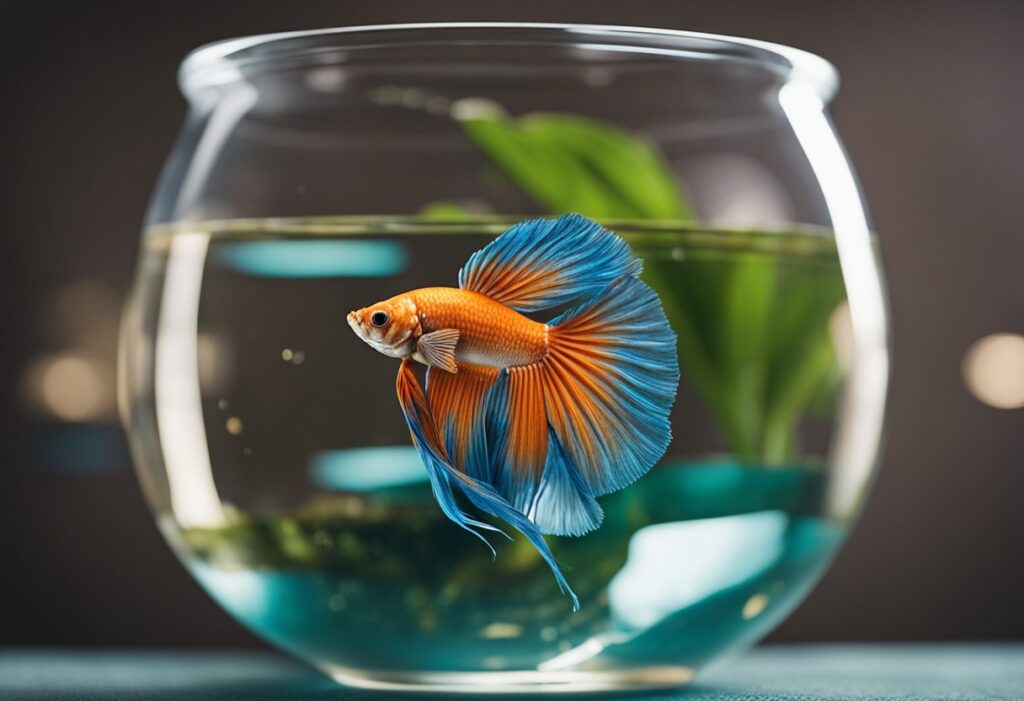
Species Overview
Betta fish, also known as Siamese fighting fish, are native to Southeast Asia and are popular aquarium pets due to their vibrant colors and unique personalities. These fish are known for their territorial behavior and can become aggressive towards other fish if not properly housed.
Betta fish are typically small in size, ranging from 2-3 inches in length. They have a labyrinth organ that allows them to breathe air from the surface, which means they can survive in low-oxygen environments.
Dietary Requirements
Betta fish are carnivorous and require a diet high in protein. In their natural habitat, they feed on small insects, larvae, and other small aquatic creatures. In captivity, they can be fed a variety of foods including pellets, flakes, frozen or live foods such as bloodworms, brine shrimp, and daphnia.
It is important to feed betta fish a balanced diet and not overfeed them, as obesity can lead to health problems. A general rule of thumb is to feed them once or twice a day, with the amount of food they can consume in a few minutes.
While betta fish can survive for short periods without food, it is not recommended to leave them without food for more than a few days. Betta fish can become weak and susceptible to diseases if they are not fed regularly.
In conclusion, betta fish are fascinating creatures that require proper care and attention. By providing them with a balanced diet and a suitable environment, we can ensure they live long and healthy lives.
Factors Affecting Feeding Frequency
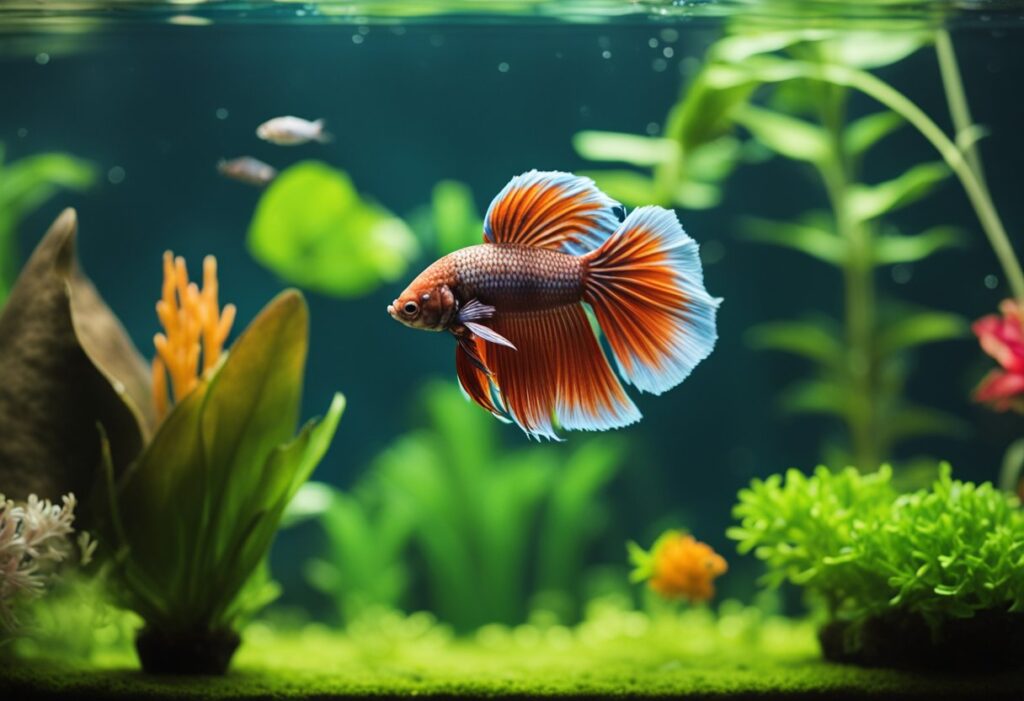
When it comes to feeding betta fish, there are several factors that can affect how often they should be fed. In this section, we will discuss three main factors that can influence feeding frequency: age and health, aquarium conditions, and water temperature.
Age and Health
The age and health of your betta fish can play a significant role in determining how often they need to be fed. Younger bettas typically require more frequent feedings than older ones, as they are still growing and developing. However, it’s important not to overfeed your betta, as this can lead to health problems such as obesity and bloating.
If your betta fish is sick or recovering from an illness, they may require more or less food than usual. It’s important to consult with a veterinarian or experienced betta fish keeper to determine the appropriate feeding schedule for your fish.
Aquarium Conditions
The conditions of your betta fish’s aquarium can also impact their feeding frequency. If the aquarium is overcrowded or dirty, your betta may become stressed and lose their appetite. It’s important to maintain a clean and healthy environment for your betta fish to thrive.
Additionally, if there are other fish in the aquarium, your betta may need to be fed more or less frequently depending on their feeding habits. Some fish are more aggressive eaters and may consume most of the food before your betta has a chance to eat.
Water Temperature
Water temperature can also affect how often your betta fish needs to be fed. Bettas are cold-blooded animals, meaning their metabolism and digestion are influenced by the temperature of their environment. In warmer water, bettas may require more frequent feedings, while in cooler water, they may need to be fed less often.
It’s important to monitor the temperature of your betta fish’s aquarium and adjust their feeding schedule accordingly. Overfeeding in cooler water can lead to digestive issues, while underfeeding in warmer water can cause your betta to become lethargic and inactive.
In conclusion, several factors can influence how often you should feed your betta fish. By considering their age and health, aquarium conditions, and water temperature, you can develop a feeding schedule that meets their specific needs and helps them thrive.
Guidelines for Feeding Absence
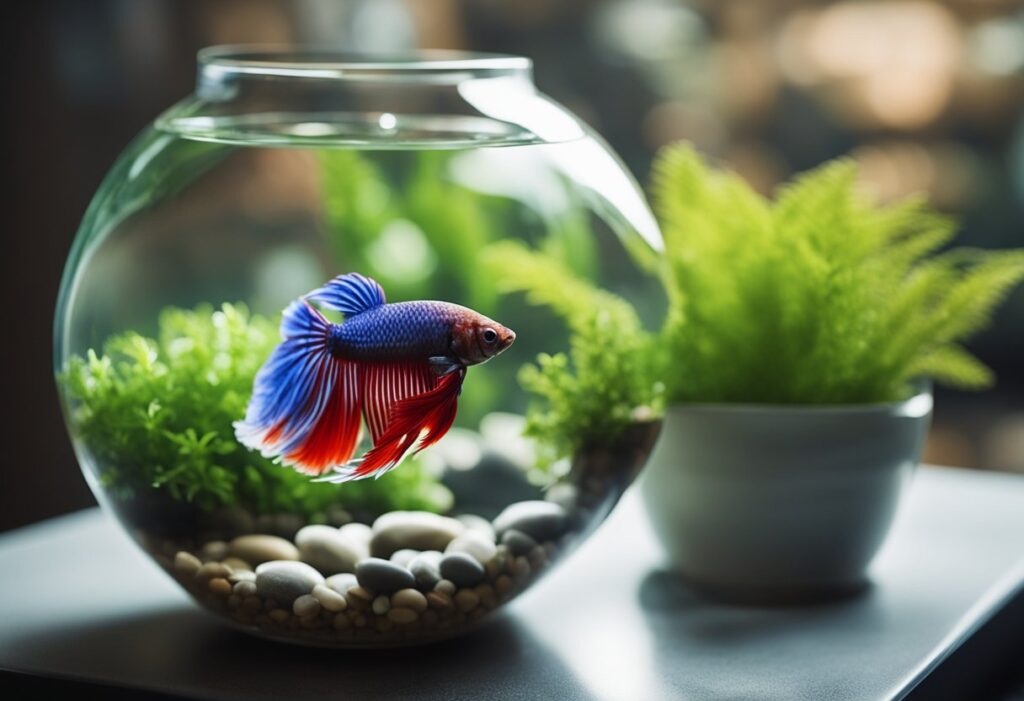
When it comes to feeding betta fish, it’s important to maintain a consistent feeding schedule to keep them healthy and happy. However, there may be times when you need to be away from home for a short or long period of time, and you’re unable to feed your betta fish as usual. In this section, we’ll provide guidelines for feeding absence to ensure your betta fish stay healthy and happy.
Short-Term Absence
If you’re going to be away from home for a short period of time, such as a weekend, your betta fish can go without food for up to three days. It’s important to make sure your betta fish is well-fed before you leave and that the water in their tank is clean. You can also consider using an automatic feeder to dispense food while you’re away.
Long-Term Absence
If you’re going to be away from home for an extended period of time, such as a week or more, it’s important to make sure your betta fish is well-prepared for your absence. Before you leave, make sure to clean their tank thoroughly and change the water. You can also consider using an automatic feeder to dispense food while you’re away.
It’s important to note that betta fish can go without food for up to two weeks, but this should only be done in extreme circumstances. If you’re going to be away for more than a week, it’s best to have someone come and feed your betta fish or arrange for a pet sitter.
In conclusion, it’s important to maintain a consistent feeding schedule for your betta fish, but if you’re going to be away from home for a short or long period of time, there are steps you can take to ensure your betta fish stay healthy and happy.
Risks of Overfeeding
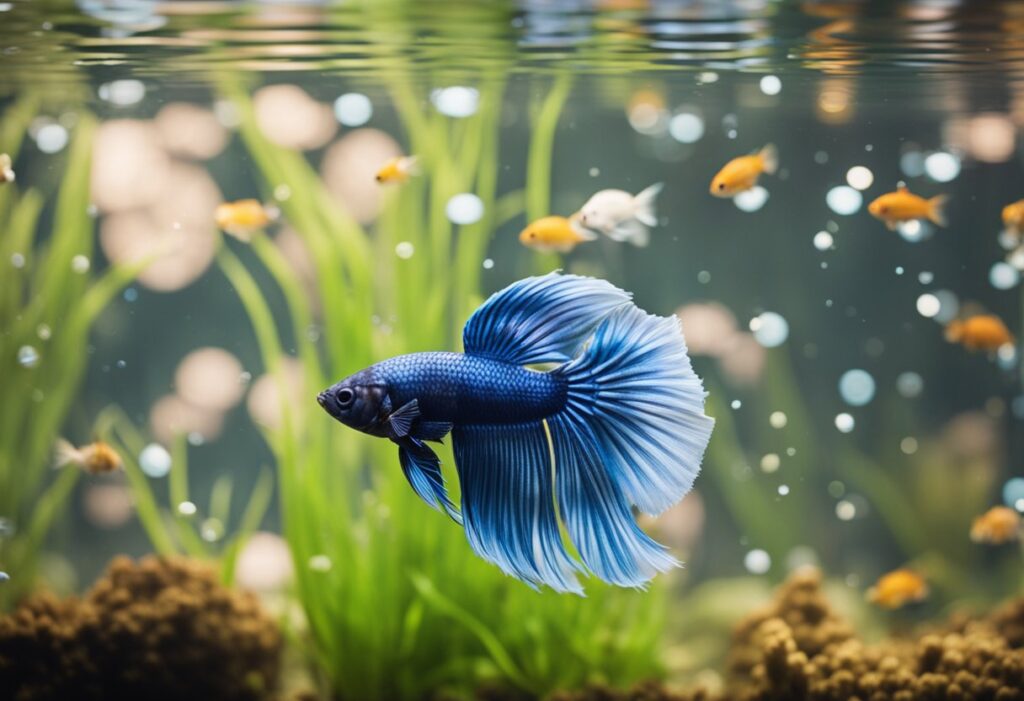
Overfeeding your betta fish can cause several health problems. It is essential to feed them the right amount of food to keep them healthy and happy. Here are some of the risks of overfeeding:
- Obesity: Betta fish can become overweight if they are overfed. This can lead to several health problems, including swim bladder disease, which affects their ability to swim properly.
- Constipation: Overfeeding can cause constipation in betta fish, which can lead to bloating and other digestive issues.
- Water quality: Overfeeding can cause an increase in waste production, which can lead to poor water quality. Poor water quality can cause several health problems, including fin rot and other bacterial infections.
- Shortened lifespan: Overfeeding can lead to a shortened lifespan for betta fish. Obesity and other health problems caused by overfeeding can reduce their lifespan significantly.
To avoid these risks, it is important to feed your betta fish the right amount of food. A good rule of thumb is to feed them two to three pellets or flakes twice a day. It is also essential to monitor their behavior and adjust their feeding schedule accordingly. If you notice your betta fish is not eating or is becoming lethargic, it may be a sign of overfeeding or an underlying health issue. In this case, it is best to consult with a veterinarian or an experienced fish keeper.
Signs of Underfeeding
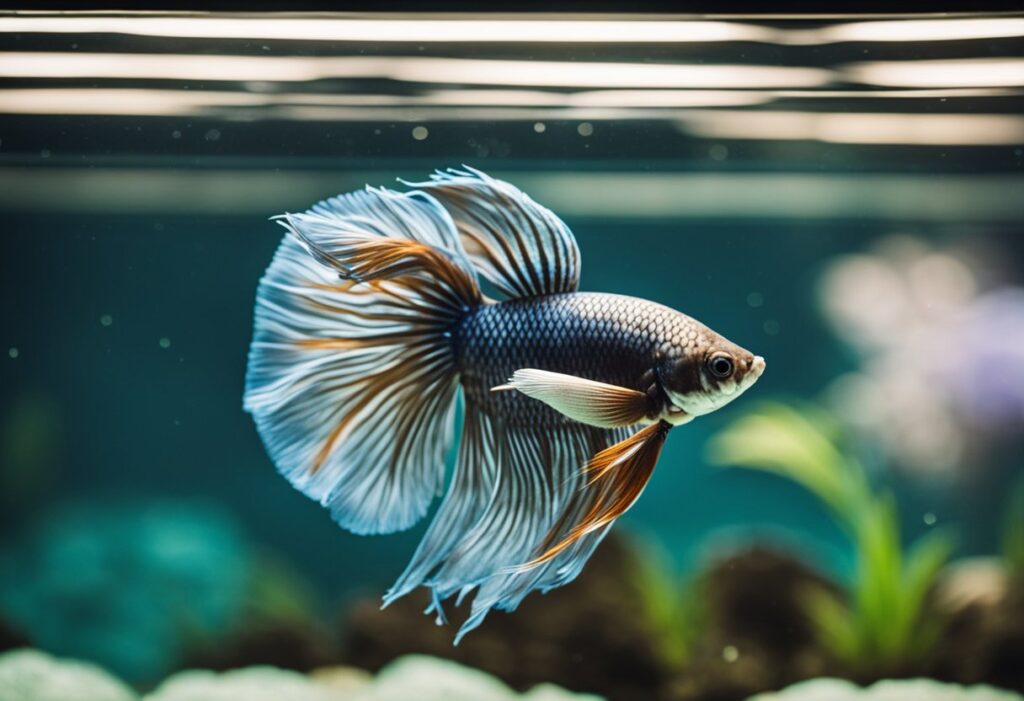
As responsible betta fish owners, we must ensure that our pets receive adequate nutrition to maintain their health and longevity. However, it’s equally important to avoid overfeeding as well as underfeeding.
Underfeeding can lead to malnutrition, stunted growth, and weakened immune systems. Here are some signs that your betta fish may be underfed:
- Lethargy: A betta fish that is not getting enough food may become lethargic and spend more time resting on the bottom of the tank or hiding in the plants.
- Loss of color: A healthy betta fish should have vibrant colors. However, if they are not getting enough food, their colors may become dull or faded.
- Sunken eyes: If your betta fish’s eyes appear sunken, it may be a sign of malnutrition. This is because a lack of food can cause the fat reserves around the eyes to deplete.
- Fin deterioration: A betta fish that is not receiving enough nutrition may experience fin deterioration. This can manifest as ragged or frayed fins, or even fin rot.
If you notice any of these signs, it’s important to adjust your betta fish’s feeding schedule accordingly. However, it’s important to note that these symptoms can also be caused by other factors such as poor water quality or disease. If you’re unsure, consult with a veterinarian or a knowledgeable aquarium specialist.
Preparing for Vacation
When planning a vacation, it’s important to consider our betta fish’s feeding schedule. Betta fish can go up to two weeks without food, but it’s not recommended to leave them without food for that long.
To prepare for our vacation, we can consider the following options:
- Automatic feeders: These devices can be set to dispense food at specific times and quantities. However, it’s important to test the feeder before leaving to ensure it’s working properly.
- Asking a friend or family member: We can ask someone we trust to come over and feed our betta fish. It’s important to provide clear instructions on how much to feed and how often.
- Reducing feeding before leaving: We can gradually reduce the amount we feed our betta fish a few days before leaving. This will help reduce the amount of waste in the tank and keep the water quality stable.
It’s important to keep in mind that betta fish are sensitive to changes in their environment, including changes in their feeding schedule. Therefore, we should choose a feeding option that will cause the least amount of stress for our fish.
Feeding Alternatives During Absence
If you plan to be away from home for a few days, you might be wondering how long your betta fish can go without food. While bettas can survive for up to two weeks without food, it’s not recommended to leave them unfed for that long.
Fortunately, there are a few feeding alternatives you can consider if you’ll be away from home for a few days:
- Automatic feeders: Automatic feeders are devices that can dispense food at set times. They can be programmed to feed your betta fish once or twice a day, depending on your preference. However, it’s important to note that not all automatic feeders are reliable, so make sure to test them out before leaving town.
- Feeding blocks: Feeding blocks are compressed food blocks that slowly dissolve over time, releasing small amounts of food into the water. They can last up to 7 days, but they can be messy and can affect the water quality, so it’s important to monitor your betta’s health closely.
- Ask a friend or neighbor: If you have a trusted friend or neighbor who can stop by and feed your betta fish, this is the best option. Make sure to provide clear instructions on how much and how often to feed your betta, and leave contact information in case of an emergency.
Remember, it’s important to not overfeed your betta fish before leaving town, as this can cause water quality issues. Providing a feeding alternative during your absence can help ensure your betta stays healthy and happy.
Post-Absence Feeding Care
After a betta fish has gone without food for an extended period of time, it is important to take special care when reintroducing food to their diet. Here are some tips for post-absence feeding care:
- Start with small amounts: When feeding your betta fish after a period of absence, start with small amounts of food. Overfeeding can lead to digestive issues and potentially harm your fish.
- Monitor their behavior: Observe your betta fish after feeding to ensure they are able to digest the food properly. If they appear to be struggling or show signs of distress, stop feeding immediately and consult a veterinarian.
- Offer a varied diet: Betta fish require a balanced diet that includes a variety of foods. Offer a mix of pellets, frozen or live foods, and vegetables to ensure they are getting all the nutrients they need.
- Maintain a regular feeding schedule: Once your betta fish has adjusted to eating again, it is important to maintain a regular feeding schedule. Betta fish should be fed once or twice a day, with small amounts of food each time.
By following these tips, you can help ensure your betta fish stays healthy and happy after a period of absence from food.
Frequently Asked Questions
What is the maximum duration a betta fish can survive without being fed?
Betta fish can survive for up to two weeks without food. However, it is not recommended to leave them unfed for such a long time as it can lead to malnutrition and other health issues.
Is it safe to leave betta fish unattended during a week-long vacation?
It is not safe to leave betta fish unattended for a week-long vacation without proper arrangements for their care. They require regular feeding and water changes to stay healthy.
How frequently should a betta fish be fed under normal circumstances?
Under normal circumstances, betta fish should be fed once or twice a day. Overfeeding can lead to health problems, so it is important to offer only small amounts of food at each feeding.
What alternatives exist for feeding betta fish when owners are away?
Owners can use automatic feeders or ask a trusted friend or family member to feed their betta fish while they are away. It is important to provide clear instructions on how much and how often to feed the fish.
Can betta fry sustain themselves without food and for how long?
Betta fry cannot sustain themselves without food and require frequent feeding. They should be fed small amounts of food multiple times a day.
What is the recommended interval for water changes in a betta fish tank?
The recommended interval for water changes in a betta fish tank is once a week. This helps to maintain good water quality and prevent the buildup of harmful substances.











